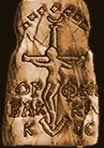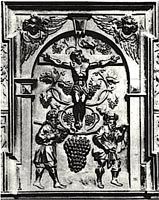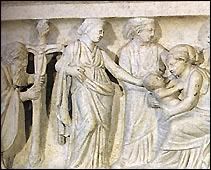Hi again emilysmith,
Hercules was the first to pop into my mind. There are a number of versions of the story of Hercules. One of those versions names his mother, Alcmenes (also the name for the virgin goddess) as a virgin.
No, not one. They all tell the story of an oath that Amphitryon makes to preserve her virginity until he returns from seeking revenge for the death of her brother. They are cousins. For heavens sakes the stories themselves show that she bore two sons by intercouse, one with Zeus and one with Amphitryon, she wasn't a virgin and the legends don't make that claim. Read them. You didn't provide a source for your quote so I can't assess it. I realize there are the allegations your making, repeating them from dubious sources doesn't offer more credibility, it compounds the frustration.
This detail of Hercules isn't all that important. We can name a number of virgin-born figures, but the point that I was making was that this wasn't necessarily reason to suggest that all aspects of the story were borrowed. I was just making a point that there are similarities, not just between Jesus and Hercules, but many other figures. The most important virgin-born figure (as it relates to synthesis into the Christian theology) to Jesus would be Mithra, born of a virgin in a cave.
Source? Mithra was not born of a virgin and what is the point of a post Christian similarity? Where is the scholarly article or source for these claims? What is the point of your similarities? There are carbon based similarities between bugs and man rocks, so what? Are you making a syncretic claim or not?
Christ's perilous possibility with Herod and Hercules' with Hera are more dissimilar than similar.
suppose I could have been wrong, but I was under the impression that Jesus went to Hell and preached to the angels that had been cast down there. My Bible study is a little rusty, though. Now that i am picking through, I see that it is maybe just implied by Isaiah.
The more prescient point is the dissimilarities. Hades and Hell are syncretic possibilities for sure but are not the same thing, and the reasons Hercules and Jesus interacted with either are completely disimiliar.
We agree Herc wasn't resurrected akin to Jesus.
To suggest that there are no similarities would be the equivalent of burying your head in the sand... truly.
Sure, but to suggest that there are not any
meaningful similarities to substantiated your claim, would be completely mature, reflective and consistent with scholarly consensus and sources.[/quote]
A crucified Dionysus 400 years before Christ in the same vicinity?
Source, because the syncretism works after Christianity as well, although your timing is claimed it isn't source documented anywhere.
A virgin-born Mithra whose members partake of his flesh just like the Christian sacrament? These are fairly specific parallels.
Mithra was not born of a virgin unless you mean a rock is a virgin but not a female human virgin. There is no Christian sacrament either. There is common Roman meals that mithraists participated in. There is one quote often bandied that cannot be properly attributed to Mithra. What is your sources?
I, of course, understand the reluctance of believers to accept that a synthesis of these stories created their religion, but don't pretend that it isn't a possibility.
I won't pretend if such proper scholarly research compels me so, but it doesn't, and it isn't any sort of reluctance, this is really bad skepticism, really. I take skepticism very seriously and have deep respect for robust and thoughtful expressions of it, but this stuff has been shown silly by scholarly consensus, and not just believers. I think a reluctance of non-believers to have easy and simple answers to a complex matter is also at play.
my best, mikwut
All communication relies, to a noticeable extent on evoking knowledge that we cannot tell, all our knowledge of mental processes, like feelings or conscious intellectual activities, is based on a knowledge which we cannot tell.
-Michael Polanyi
"Why are you afraid, have you still no faith?" Mark 4:40


